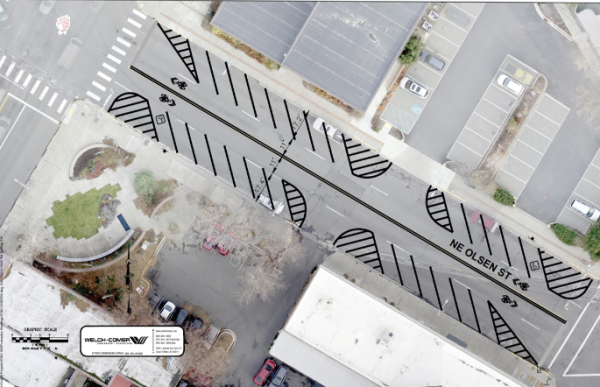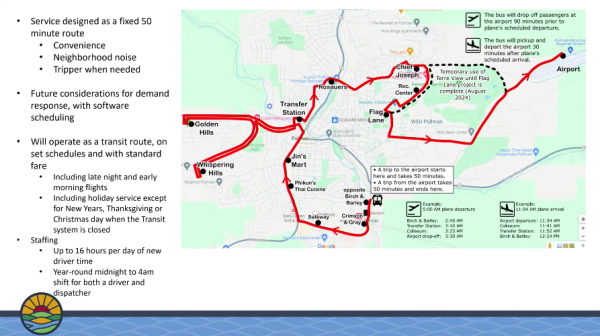Pullman City Council discusses district court
Councilmembers grapple with space, cost to keep district court downtown
BONNIE JAMES | THE DAILY EVERGREEN
Ned Warnick, principle architect at Design West, presents the design for new a city hall building on Tuesday at Pullman City Hall.
February 27, 2019
In a Pullman City Council meeting Tuesday night, members discussed moving district court operations, which run twice a week in Pullman, to the new city hall.
The council previously discussed keeping district court at the old city hall. However that presents several challenges, said Ned Warnick, principal architect at Design West Architecture.
The total cost of running the old hall building are estimated at $50,000 a year, Warnick said. In addition to that, said City Administrator Adam Lincoln, the roof and heating, ventilation and air conditioning (HVAC) system would eventually need to be replaced.
A power outage the same day, Lincoln added, made staff aware of a leak in the IT room.
“We’re just buying a little more time on this building until it needs to be replaced,” Lincoln said.
If the new city hall were to accommodate district court, the change is physically possible, Warnick said. However, holding district court at the new location could present several of its own problems for staff as well as additional financial costs.
“[The district court] doesn’t take a lot of space,” he said, but, “it will have a significant impact on the function of City Hall.”
Currently, district court held in the Pullman City Hall does not meet statewide recommendations for holding court in a multi-use building, Warnick said. Things like weapon screenings and security checks for courtroom attendees, as well as separate entrances for judges, jurors and members of the public would be necessary in the design for a new district court location.
Meeting state recommendations for court could impact the facility in several ways; the additional security checkpoints would require anyone passing through several entrances within city hall to pass the checkpoints any time district court personnel are in the building, Warnick said.
For instance, if city hall staff members wanted to have a face-to-face meeting with someone else in the building, they might have to pass through the security checkpoint depending on the day, he said.
Similar requirements could also necessitate separate waiting areas for different groups that are part of court cases, and thus require more space and the one less service desk, Warnick said. Court days would require a security guard at one of the checkpoints, adding to human resource costs.
One councilmember asked if the rules regarding district court were strictly required, as the current city hall has operated for year without meeting those recommendations.
Lincoln said although it is unclear exactly how those recommendations are enforced, it is important that the city follows state guidelines.
“We’re relying a lot on the fact that we’ve got a police station across the street,” Lincoln said. “We aren’t meeting the standards as Washington State recommends them.”
Councilmember Ann Parks asked about the county’s financial responsibility in paying for district court expenses, as the cities do not usually hold district court unless they are at the county seat or have a separate municipal court.
Lincoln said the county’s financial responsibility will be an ongoing discussion between city and county officials.
While the city has yet to find an ideal solution for a new district court location, several council members expressed concern with the possibility of removing district court from Pullman entirely.
“I have a serious concern about transporting people to Colfax,” said councilmember Dan Records. “Especially for people applying for temporary restraining orders.”
Records said he was concerned for WSU students, international students and people who might have trouble traveling or have experienced crimes like sexual assault.
“If you put extra items on that person’s checklist, it becomes discouraging enough so that those people won’t get the services and support they need,” he said.
Many Pullman residents rely on public transportation, councilmember Nathan Weller said. Currently there is little or no public transportation options for residents to go to Colfax.
Councilmember Pat Wright said she was approached by some residents voicing concerns about district court no longer being available in Pullman.
Some residents feel misled, she said, because they were under the assumption that district court operations would transition to the new facility, although this was never decided upon.
“People have gotten used to the idea that they will be in Pullman,” Weller said. “It’s not that people were misled, it’s just it was an assumption that it would go in that direction.”
The City Council will continue discussion on district court in following meetings.
Paul Kimmell, a regional manager for Avista, also spoke to the council Tuesday.
Kimmell said the company is working on their smart meter project, which will serve as the foundation for the company’s smart grid. In the future, customers will be able to access more information online about their energy consumption and electricity costs through the month.
The technology will give users “near-real-time info on energy use,” Kimmell said, and allow Avista to dispatch directly to an outage.
Kimmell also mentioned some customers had concerns about radiofrequency emitted by the smart meters.
“We do not take that lightly,” he said. “A smart meter, in respect to radiofrequency, is very much on the low side.”
The company plans to expand its smart meter installations in 2019 and 2020, he said. When it happens, residents will be notified. Many of the changes will happen when Pullman has fewer people in it, he said.
“We figured we should wait until most of the students are gone,” Kimmell said.























